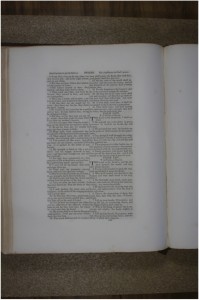 The photo shows an ordinary page from Samuel Simon Schmucker’s personal Bible. Schmucker was the founder of the Gettysburg Lutheran Theological Seminary at Gettysburg, Pennsylvania , in 1826 and remained its president through the Civil War. He was an outspoken critic of slavery from the 1840s on and his seminary and home were occupied by Confederate troops at the end of the first day of the Battle of Gettysburg on July1, 1863 until they retreated from Gettysburg on July 5th. Schmucker fled Gettysburg before the battle because he feared his life would be in danger if he were taken by Confederates. He returned afterwards to find his home in a shambles.
The photo shows an ordinary page from Samuel Simon Schmucker’s personal Bible. Schmucker was the founder of the Gettysburg Lutheran Theological Seminary at Gettysburg, Pennsylvania , in 1826 and remained its president through the Civil War. He was an outspoken critic of slavery from the 1840s on and his seminary and home were occupied by Confederate troops at the end of the first day of the Battle of Gettysburg on July1, 1863 until they retreated from Gettysburg on July 5th. Schmucker fled Gettysburg before the battle because he feared his life would be in danger if he were taken by Confederates. He returned afterwards to find his home in a shambles.
Most museums and archives look at Bibles as artifacts with little or no historical meaning except for the information they may contain as records of family births and death s.. A Bible may be collected because it is an early edition or has a connection with a well-known printer or has illustrations by artists and engravers of note.
Schmucker’s Bible has neither family information nor is it identified as a particular translation or by a noted.publisher. Instead , its significance is based on its documentation of his personal use and efforts to translate and interpret the written words as they related to Biblical arguments for and against slavery.
Passages that were commonly used to defend slavery as “ordained by God,” are highly annotated in Schmucker’s Bible, with words crossed out and retranslated.
For example:
Leviticus 25:10
- “And ye shall hallow the fiftieth year, and proclaim liberty throughout all the land unto all the inhabitants thereof: it shall be a jubilee unto you; and ye shall return every man unto his possession, and ye shall return every man unto his family.”
- SSS bracketed this verse
Leviticus 25:40-41
- “But as an hired servant, and as a sojourner he shall be with thee, and shall serve thee unto the year of jubilee: And then shall he depart from thee, both he and his children with him, and shall return unto his own family, and unto the possession of his fathers shall he return.”
- SSS bracketed these verses
Deuteronomy 20:14
- “But the women, and the little ones, and the cattle, and all that is in the city, even all the spoiled thereof, shalt thou take unto thyself: and thou shalt eat the spoil of thine enemies, which the LORD thy God hath given thee.”
- SSS: “Not as slaves nor even servants, but to live with you & become incorporated with you as a people. XXI: 10&”
Matthew 7:12
- original: “Therefore, all things whatsoever ye would that men should do to you, do ye even so to them: for this is the law and the prophets.”
- SSS: “All things therefore, which ye would that men should to do you, do ye also to them: for this is the law and the prophets.”
- SSS: “i.e. this is the substance of all that is commanded in S.S. concerning our duty to our fellow man.”
The Bible itself played a role in the battle and its aftermath. Confederate soldiers trashed Schmucker’s home, destroying papers and books and damaging his house. When he returned home, the Bible, muddied and damaged, had been placed back on a shelf. On the back page a pencil inscription explained that a Confederate soldier had found the Bible and put it back.
It would be easy to miss the meaning of this artifact without its history of ownership and use. Its plain leather binding is in poor repair and a quick look would not reveal the theological struggles of its owner. But, combined with its ownership, history and connection to the Battle of Gettysburg , it is an artifact that can convey complex interpretive, personal and emotional meanings.
~ Barbara Franco




Jefferson famously edited his own bible to reflect his own theology. Do you know if this kind of editing and annotating was a common practice or was even taught as a religious discipline?
Thanks for sharing this–this is tremendously interesting. Is there any evidence that Confederate soldiers looked through the Bible and saw the notations Schmucker had made about slavery?
I love this kind of close reading, and I’d love to see it placed in the context of scripture-reading practices of the time. Did his contemporaries annotate their Bibles, and how?